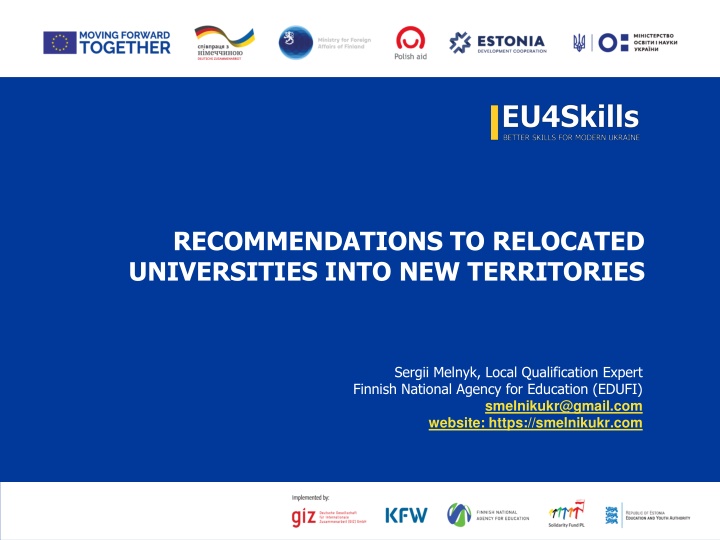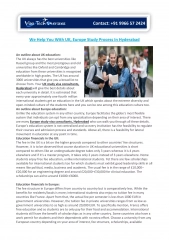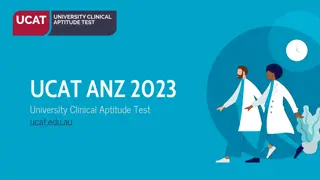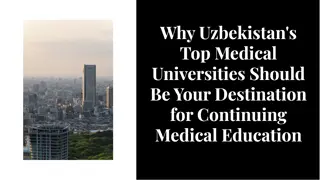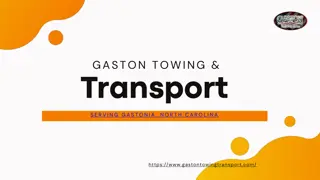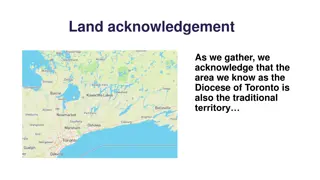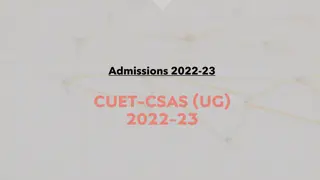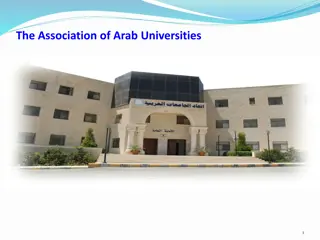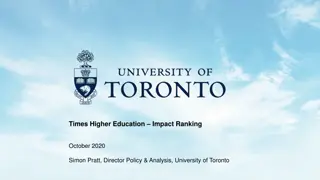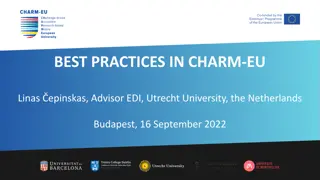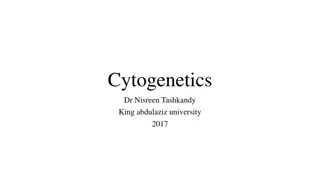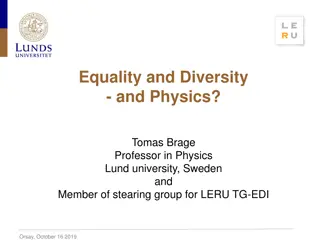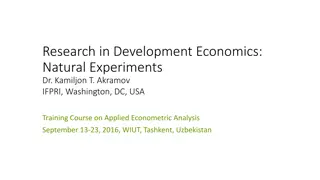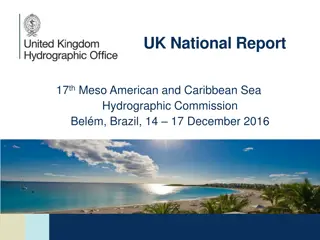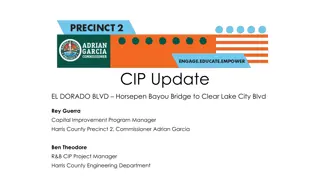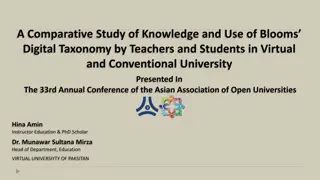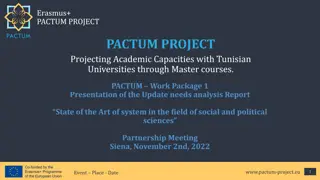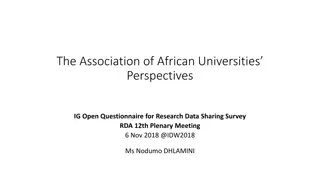RECOMMENDATIONS TO RELOCATED UNIVERSITIES INTO NEW TERRITORIES
As of July 01, 2022, several higher education institutions have been relocated in Ukraine due to war-related events. The process involved both HEIs and PPHEIs settling in various regions. Challenges exist in training specialists due to a lack of effective forecasting mechanisms and legal complexities. Utilize information sources recommended by the MOES of Ukraine for guidance on training provided by relocated institutions.
Download Presentation

Please find below an Image/Link to download the presentation.
The content on the website is provided AS IS for your information and personal use only. It may not be sold, licensed, or shared on other websites without obtaining consent from the author.If you encounter any issues during the download, it is possible that the publisher has removed the file from their server.
You are allowed to download the files provided on this website for personal or commercial use, subject to the condition that they are used lawfully. All files are the property of their respective owners.
The content on the website is provided AS IS for your information and personal use only. It may not be sold, licensed, or shared on other websites without obtaining consent from the author.
E N D
Presentation Transcript
RECOMMENDATIONS TO RELOCATED UNIVERSITIES INTO NEW TERRITORIES Sergii Melnyk, Local Qualification Expert Finnish National Agency for Education (EDUFI) smelnikukr@gmail.com website: https://smelnikukr.com
As of July 01, 2022, according to operational information of the MOES 29 HEIs and 64 separate structural subdivisions of HEIs were relocated 1. GENERAL INFORMATION ABOUT RELOCATED HIGHER EDUCATION INSTITUTIONS (HEI) AND PROFESSIONAL PRE-HIGHER EDUCATION INSTITUTIONS (PPHEI) On the same date 40 PPHEIs and one separate structural subdivision of PPHEI also were relocated 17 of 134 relocated educational institutions of these types were forced to do that repeatedly after 2014, in particular, 11 HEIs and 6 PPHEIs
GENERAL INFORMATION ABOUT RELOCATED HEI AND PPHEI HEIs have been relocated to the city of Kyiv, and to Zaporizka, Dnipropetrovska, Poltavska, Kirovohradska, Mykolaiivska, Khmelnytska, Rivnenska, Ivano-Frankivska, Volynska, ternopilska regions during the war. PPHEIs have also been relocated to 11 regions, though not all correspond to the mentioned above.
PARTICULARITIES OF RELOCATED HEIS PLACEMENT In most cases relocated universities settle down on the territory of industry-related HEIs or other educational institutions
2. INFORMATION SOURCES RECOMMENDATIONS ON TRAININGS PROVIDED BY RELOCATED HEIS AND PPHEIS 1 MOES of Ukraine in the Section Main Activities. Scientific and Analytics Activities. Analytics : https://iea.gov.ua/en/main-activities/scientific-and-analytics-activities/analytics/ Researches presented on the web site of the Institute of Educational Analytics of the 2 Statistical and analytical information of the State Employment Service and its regional employment centers: https://www.dcz.gov.ua/analitics/69
3. PROBLEMS WITH DETERMINATION OF DIRECTIONS AND VOLUMES OF SPECIALISTS TRAINING During the period of Ukraine s independence, the country has not developed an effective mechanism for forecasting and planning the needs and volumes of personnel training, especially specialists. Additional problems were brought by the Law of Ukraine On Higher Education , which in fact annulled clear definition of professional qualification in a diploma, that significantly complicates the search of a HEI graduate on the labor market. State Employment Service forms statistics on demand and supply by professions from national data source Classifier of Ukraine DK:003 "Professions Classifier . However, it is not updated and adjusted to ILO s (ISCO-08). Until last year October, soviet times practice of naming occupational qualifications by occupations titles also caused confusion. National Agency for Qualifications has not filled the National Register with existing qualifications, focusing on adding only new positions to it.
4. How issues of HE supply and demand are solved in the EU countries 1/2 Successful functioning of EVROPASS employment system: https://europa.eu/europass/en. Introduction of ESCO qualification system (European Skills, Competences, Qualifications and Occupations). Since May this year the Ukrainian-language version of this system has been launched. https://esco.ec.europa.eu/en/use- esco/download There are a lot of specialized developments of the European Training Foundation for working qualifications and qualifications of the "junior specialist" or professional junior bachelor type: https://www.etf.europa.eu/en and CEDEFOP: https://www.cedefop.europa.eu/en
4. How this issue is solved in the EU countries 2/2 The majority of the EU member states base their activity on prediction and planning the amount of personnel training on public-private partnership basis. The state forms and funds analysis and development of medium- and long-term forecasts and employers calculate concrete sectoral needs by regions and professions for short and medium terms. The latest development of profiled European commission is creation and functioning of the BIGDA A forecasting system, which efficiently applies artificial intelligence.
5. HOW TO DETERMINE PROSPECTS AND DIRECTIONS OF SPECIALISTS TRAINING IN NEW REGIONS? 1 The 1st STEP. Determination the output of bachelors and/or masters by specialties during previous 3-5 years. It is necessary to take the appropriate region for certain specialties (pedagogical, medical, etc.). Several regions or the whole country could be taken for more diversified specialties. Information source: data from the Unified State Electronic Database on Education (USEDE) and/or the State Statistics Service. 2 The 2nd STEP. Formation the list of occupations/positions/professional names of works for each profile specialty. Information source: Appendix 2 to the Methodological approaches to assessment of staffing needs in specialists by specialties: https://smelnikukr.com/wp-content/uploads/2022/03/2- na_sajt_AZ_Melnik_SV_Metodolog_pidh_otsinki_kadr_potr_fah_VO-final.pdf
5. HOW TO DETERMINE PROSPECTS AND DIRECTIONS OF SPECIALISTS TRAINING IN NEW REGIONS? 3 The 3rd STEP. Calculation of balancing between demand and supply of specialists on the official labor market by professions, included to the list by profile specialty. Comparison of results with yearly output of relevant specialists. Information source: statistical data of the State Employment Service and/or regional employment centers. Methodological recommendation of the relevant direction: https://smelnikukr.com 4 The 4th STEP. Analysis of the obtained results and decision making.
6. FOR WHICH REGIONS AND RELOCATED UNIVERSITIES RELEVANT CALCULATIONS ARE ALREADY BEEN CONDUCTED? In the framework of the UNDP Project Assessment of institutional capacity of target relocated higher education institutions it is planned to make relevant calculations for: 8 HEIs: Donetsk National Technical University; Donbas National Academy of Civil Engineering and Architecture; Mykhailo Tuhan-Baranovskyi Donetsk National University of Economics and Trade; Horlivka Institute of Foreign Languages SHEI Donbas State Pedagogical University ; Taras Shevchenko Luhansk National University; Volodymyr Dahl East Ukrainian National University; Luhansk National Agrarian University, Mariupol State University 6 regions: 1. Kyiv city 2. Volyn region 3. Dnipropetrovsk region 4. Ivano-Frankivsk region 5. Poltava region 6 Khmelnytskyi region
7. RECOMMENDATIONS FOR RELOCATED HEIS AND PPHEIS IN THE POST-WAR PERIOD. FOCUS ON ADULT EDUCATION Introduction of training, retraining and in-service training of personnel by micro degrees (microcredits/micro qualifications) Development the necessary toolkit for this aim (educational programs, qualification requirements, tools and methods of evaluation etc.), aimed at short-term training, simplified procedure of training results recognition.
7. RECOMMENDATIONS FOR RELOCATED HEIS AND PPHEIS IN THE POST-WAR PERIOD. FOCUS ON ADULT EDUCATION modernity of professional skills, their technological and technical level, adaptability to international/interregional labour markets, long-term application in European countries, etc.; adaptability of these micro degrees to Ukraine s needs in the war and post-war period; orientation on different categories of population, primarily on adults, who will need retraining and professional orientation changing according to the situation; short-term training and obtaining of partial professional qualifications, their mobility between different professional groups and types of economic activity; considering the possibility of application of micro degrees for women refugees to the EU countries with a focus on their further temporary employment and practical application after returning home; minimization of bureaucracy that primarily provides abolition/simplification of licensing procedures for educational services providers, accreditation of entities of professional qualifications assignment, micro degrees programs etc.
8. REORIENTATION ON PRIMARY TRAINING OF SPECIALISTS WHICH ARE NECESSARY IN THE POST-WAR CONDITIONS AND COUNTRY RECONSTRUCTION. Recent studies allow the following professional qualifications to be recommended for training/retraining in the war period: 8.1 Construction and reconstruction of real estate objects destroyed during the war: engineer consultant (construction), architect, works executor, civil engineer, architect on restoration of architectural and urban heritage, architectural planning technician, technician technologist (construction materials manufacturing), designer-executor, executor of artistic and decoration works, measurer of real estate objects, engineer and technic electrician, power engineer and others.
8. REORIENTATION ON PRIMARY TRAINING OF SPECIALISTS WHICH ARE NECESSARY IN THE POST-WAR CONDITIONS AND COUNTRY RECONSTRUCTION. 8.2 Rehabilitation of territories and population from results of war aggression: Engineer of real estate inventory, different groups of psychologists and rehabilitation specialists, maintenance engineer, engineer/instructor in pyrotechnical, demining and explosive works, detective, private detective, graphologist, master of service cynology, rescuer-cynologist, sapper (demining), cynologist and others.
8. REORIENTATION ON PRIMARY TRAINING OF SPECIALISTS WHICH ARE NECESSARY IN THE POST-WAR CONDITIONS AND COUNTRY RECONSTRUCTION. 8.3. Service sphere (social sector): andragogue, social employee, social pathologist, specialist in conflict resolution and mediation in social and political sphere, career advisor, instructor on labor adaptation, instructor on pre-hospital care; speech and language therapist; consultant of professional development center; specialist on youth issues (youth worker); chaplain (army chaplain, chaplain in health care, penitenciar chaplain etc.); polygraph examiner; engineers and specialists on prosthetics and others
8. REORIENTATION ON PRIMARY TRAINING OF SPECIALISTS WHICH ARE NECESSARY IN THE POST-WAR CONDITIONS AND COUNTRY RECONSTRUCTION. 8.4. Agriculture and forestry, production and processing of agricultural products etc: agronomist researcher, researcher/professional/specialist in fruit and vegetable growing and grape growing, professional in fishing, professional/technician technologist, technologist in production and processing of animal products, technician mechanic of melioration in agriculture, technician mechanic in agriculture, agricultural technician, technician land manager, technologist in agronomy, specialist in beekeeping, technicians- technologists in production of dairy products, fats and fat substitutes, polysaccharides, sugar substances, meat products, flour, confectionery products and food concentrates and others.
8. REORIENTATION ON PRIMARY TRAINING OF SPECIALISTS WHICH ARE NECESSARY IN THE POST-WAR CONDITIONS AND COUNTRY RECONSTRUCTION. 8.5. Sphere of energy saving, energy efficiency, renewable energetics development and energy security: specialist in untraditional types of energy, specialist in energy saving management in buildings; professional/specialist in energy management, ergonomist, consultant on energy saving in buildings, consultant on energy saving and energy efficiency; wind energy, hydro energy and solar energy equipment operation technician, electrician on maintenance and repair of wind energy equipment, executor of works on adjustment and repair of energy equipment and others.
8. REORIENTATION ON PRIMARY TRAINING OF SPECIALISTS WHICH ARE NECESSARY IN THE POST-WAR CONDITIONS AND COUNTRY RECONSTRUCTION. 8.6. Industry, in particular, machine-building, production of dual-purpose products etc. mechatronic, mechatronic technician, engineer (technician), technological engineer, (technological technician) and design engineers in the most profile industries, oriented on defense capability, infrastructure reconstruction and manufacturing of dual-purpose (diversification) products etc. 8.7. Reforming of military, law enforcement and other spheres of national, civic, cyber and other securities. The main direction that doesn t require public discussion.
POSTSCRIPT It should be noted that this is not an exhaustive list of recommendations and proposals. Many issues require discussion, support of the state and international/foreign community, for example: Merging of educational institutions of different types into large educational hubs. Formation of joint universities in context of Ukraine s status of a candidate for EU membership. Increasing the number of trained foreign languages teachers/interpreters and teachers/interpreters of Ukrainian language for closer cooperation of our country with foreign business-partners, support of labor migrants etc.
Thank you for your attention!
